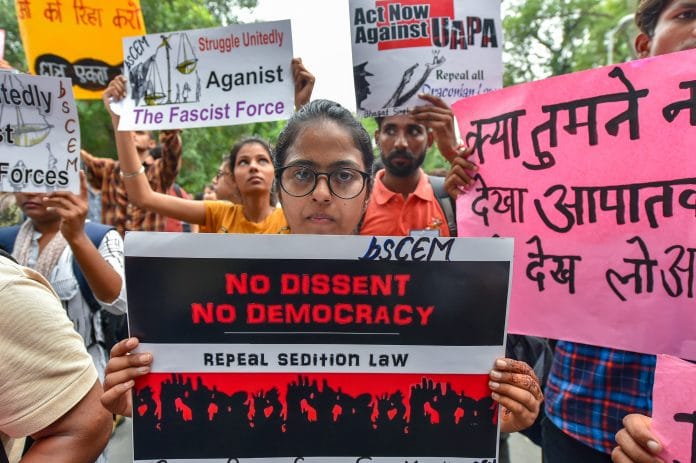Panel asserts that people should be allowed to point out ‘loopholes’ in govt policy, says ‘national interest’ can’t be used to curb free speech.
New Delhi: Criticism of the government does not amount to sedition as “singing from the same songbook is not a benchmark of patriotism,” the outgoing Law Commission of India has noted in a consultation paper on sedition it released Thursday.
The commission, whose term ends today, has also underlined that “berating the country on a particular aspect”, such as saying that India is “racist for its obsession with skin colour as a marker of beauty” cannot be deemed sedition — covered by Section 124A of the Indian Penal Code, 1860 — as it does not threaten the idea of the nation.
It has also asserted that ‘national interest’ can’t be used to curb free speech.
Also read: Why Law Commission didn’t submit final report on Modi’s ‘one nation, one election’ goal
Here are some of the interesting observations and comments in the paper:
Criticism of government not sedition: In a democracy, singing from the same songbook is not a benchmark of patriotism. People should be at liberty to show their affection towards their country in their own way. For doing the same, one might indulge in constructive criticism or debates, pointing out the loopholes in the policy of the government. Expressions used in such thoughts might be harsh and unpleasant to some, but that does not render the actions to be branded seditious.
Section 124A should be invoked only in extreme cases: It should be used only in cases where the intention behind any act is to disrupt public order or to overthrow the government with violent and illegal means. For merely expressing a thought that is not in consonance with the policy of the government of the day, a person should not be charged under the section.
Some things that just aren’t sedition: Expression of frustration over the state of affairs or, for instance, calling India ‘no country for women‘, or a country that is “racist” for its obsession with skin colour as a marker of beauty are critiques that do not ‘threaten‘ the idea of a nation. Berating the country or a particular aspect of it, cannot and should not be treated as sedition. If the country is not open to positive criticism, there lies little difference between the pre- and post-independence eras. Right to criticise one‘s own history and the right to ‘offend‘ are rights protected under free speech.
National interest can’t be used to curb free speech: While it is essential to protect national integrity, it should not be misused as a tool to curb free speech. Dissent and criticism are essential ingredients of a robust public debate on policy issues as part of vibrant democracy. Therefore, every restriction on free speech and expression must be carefully scrutinised to avoid unwarranted restrictions.
Also read: Don’t oppose simultaneous elections just because it is Narendra Modi’s idea
The commission has also posed some very important questions in the consultation paper. These include:
a) Since this section was brought in by the British to curb dissent in India and use it as a tool to oppress Indians, and, more importantly, since Britain abolished sedition laws 10 years ago, citing that the country did not want to be quoted as an example of using such draconian laws, shouldn’t India finally remove this clause?
b) Should sedition be not redefined in a country like India – the largest democracy of the world — considering that right to free speech and expression is an essential ingredient of democracy ensured as a Fundamental Right by our Constitution?
c) Will it be worthwhile to think of an option of renaming the section with a suitable substitute for the term ‘sedition’ and prescribe punishment accordingly?
d) What is the extent to which the citizens of our country may enjoy the ‘right to offend‘?
e) At what point the ‘right to offend’ would qualify as hate speech?
f) How to strike a balance between Section 124A and the right to freedom of speech and expression?
g) Given the fact that all the existing statutes cover the various offences against the individual and/or the offences against the society, will reducing the rigour of Section 124A or repealing it be detrimental or beneficial, to the nation?
h) In a country, where contempt of court invites penal action, should contempt against the government established by law not invite punishment?
i) What could be the possible safeguards to ensure that Section 124A is not misused?







Since 1962, it is settled law that an effort or incitement to overthrow the government by resort to violence is an essential ingredient of the crime of sedition. Despite this, how casually, flippantly, irresponsibly this section, which carries punishment of life imprisonment, has been invoked is a matter of record. There is a compelling case to rescind this law. Gandhiji had promised to do so in the 1920s. The only place Indians like to see Mahatma Gandhi is on their currency notes.